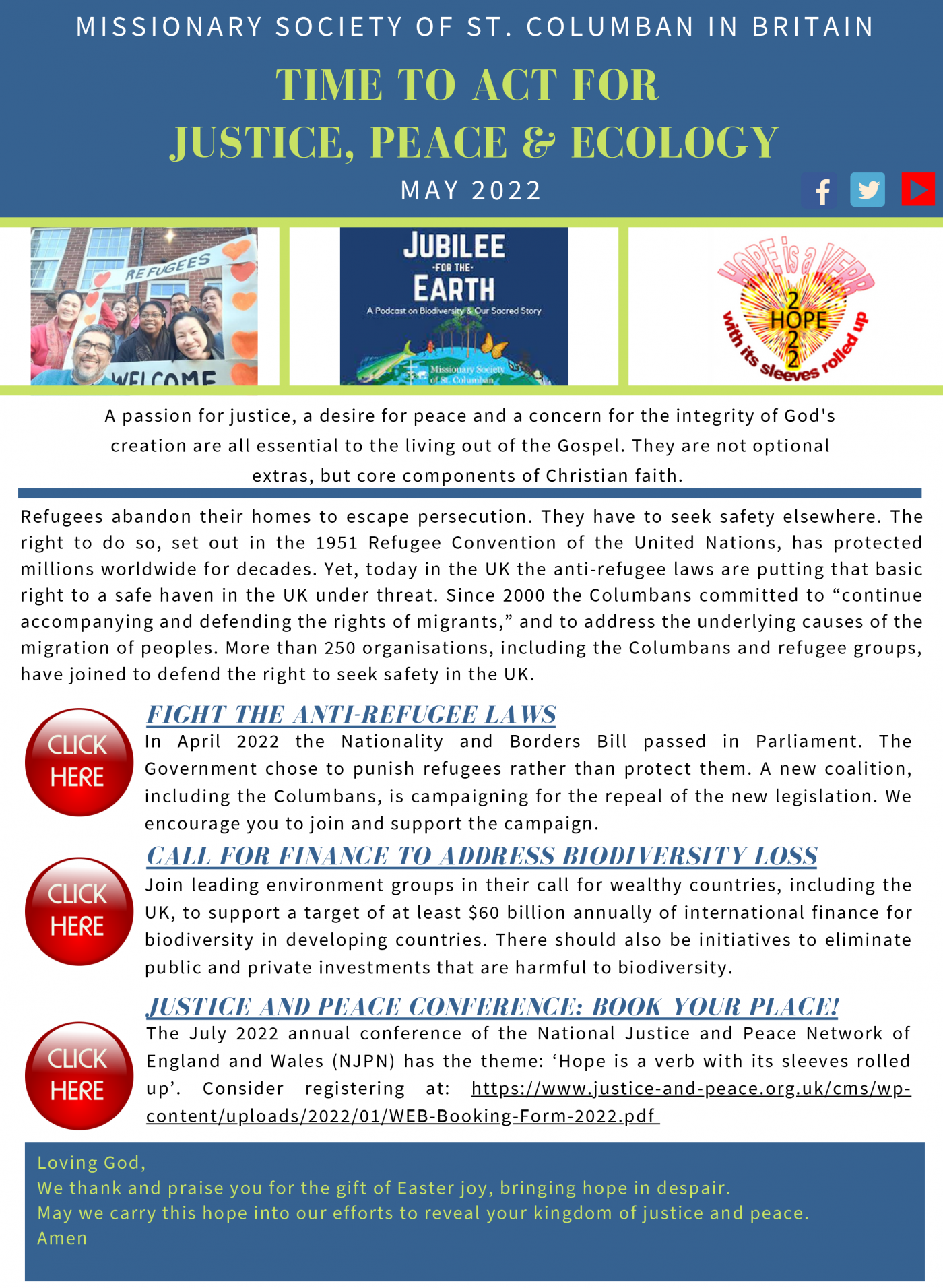On 2nd May the Dioceses and Ethnic Chaplaincies of Southwark, Westminster and Brentwood celebrated the annual Mass for Migrants, hosted this year by the Diocese of Westminster. The Mass at Westminster Cathedral was preceded by a colourful procession of banners from London’s diverse ethnic communities, parishes, chaplaincies and civic organisations. For decades the Church has welcomed people from many shores, and this Mass – in honour of St Joseph the Worker – celebrated the international diversity of congregations and their contributions to society. It also demonstrates the Church’s commitment to welcoming strangers. The Columbans were represented there.
Refugees abandon their homes to escape war and persecution. They have to seek safety elsewhere. The right to do so, set out in the 1951 Refugee Convention of the United Nations, has protected millions worldwide for decades. Yet, today in the UK the anti-refugee laws are putting that basic right to a safe haven in the UK under threat. In April 2022 the Nationality and Borders Bill passed in Parliament, turning the anti-refugee Bill into the anti-refugee Laws. The Government chose to punish refugees rather than protect them.
The St. Vincent de Paul Society (SVP) has described the passing of the government’s Nationality and Borders Bill into law with no amendments as a “dark day for human rights and humanity.” The SVP has been campaigning against a number of measures in the Nationality and Borders Bill and continues to urge the government to embed principles of welcome, protection and integration into its asylum policy. The new Act does nothing for any of these values.
The SVP states that no one should have to risk their life in search of sanctuary, however many people don’t have an option as the Nationality and Borders Act does not offer safe routes for some of the most vulnerable people who need protection. The government’s plan to expand the number of immigration centres in the UK is also a cause for concern, as are plans to send asylum seekers to Rwanda for processing, which the SVP recently described as “inhuman” and “a punitive move for people that have already gone through so much already.” The passing of the Nationality and Borders Act denies people, who have often made a perilous journey to safety, equitable treatment on our shores.
The Jesuit Refugee Service (JRS) UK too has vowed to keep working towards a just and humane asylum system. At the heart of the Act is a matrix of measures to punish refugees for arriving spontaneously or travelling via other countries, including discrimination against recognised refugees on the basis of how they travelled, and criminal penalties for arriving without documents. This punitive approach to irregular entry has been deemed illegal by numerous experts and criticised by the United Nations Humanitarian Commissioner for Refugees (UNHCR).
The Act also includes: a process for fast-tracking asylum appeals in detention. This resurrects a previous system of ‘detention fast-track’ that was so unfair it was ruled illegal by the courts; provisions to roll-out asylum accommodation centres, which are currently being trialled at the asylum camp at the former Napier barracks; and provisions that would make it harder for victims of modern slavery to gain recognition and support.
The Act’s cruel measures appear to be at odds with public sympathy towards refugees. For example, more than 200,000 people signed up to host refugees fleeing the war in Ukraine; and recent research from the British Red Cross shows that over 62% think that the UK should welcome refugees. “Asylum seekers and migrants seeking a safe or better life in the UK are to be treated like toxic waste to be dumped in foreign lands,” according to Professor Ian Linden, a former director of the Catholic Institute for International Relations.
Since 2000 the Missionary Society of St. Columban committed itself in a special way to “continue accompanying and defending the rights of migrants,” and to address the underlying causes of the migration of peoples. More than 250 organisations, including the Columbans and refugee groups, have joined to defend the right to seek safety from war and persecution in the UK. They are committed to a compassionate approach that welcomes and supports refugees.

